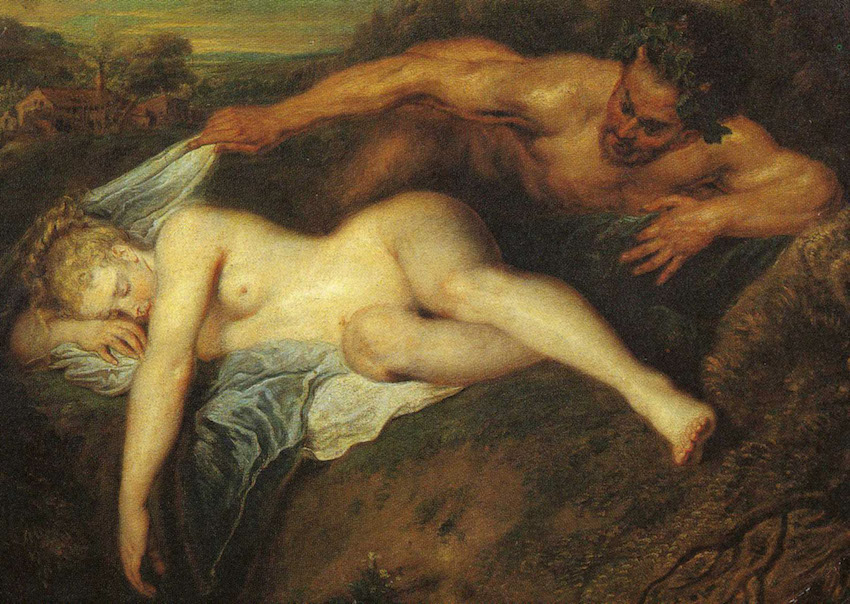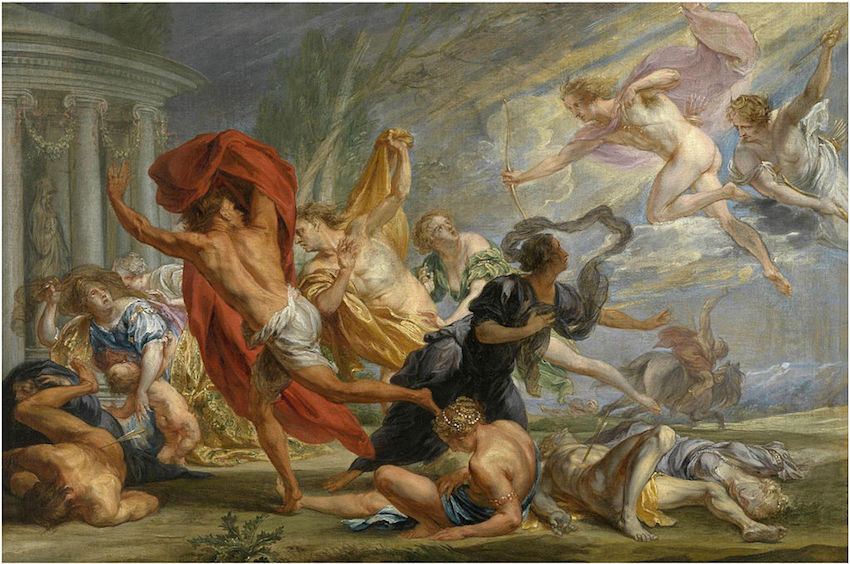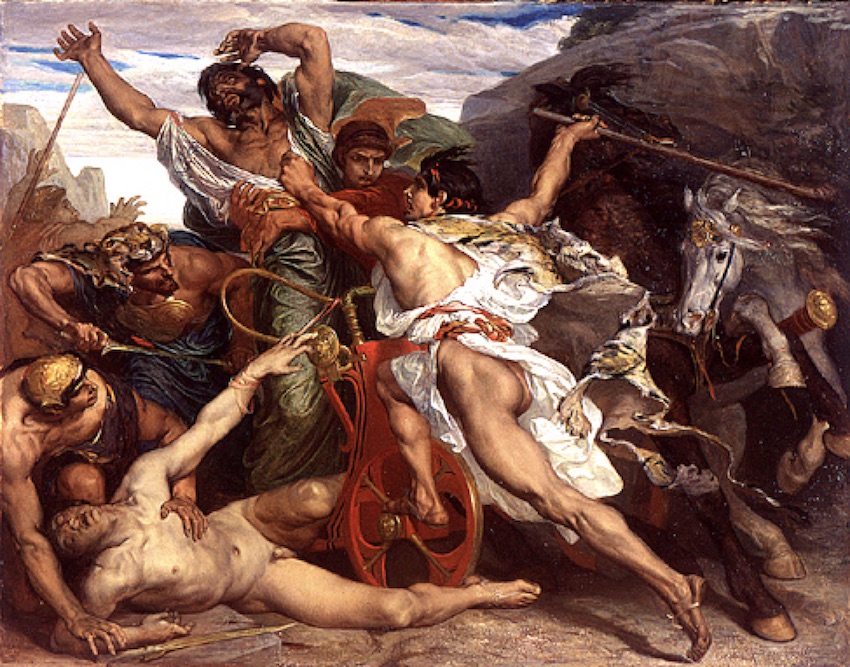Labdakos to Laios
Polydoros married Nykteis, daughter of Nykteus; Nykteus and his brother Lykos were the sons of Chthonios, one of the Spartoi. The son of Polydoros and Nykteis was Labdakos, who died when his son Laios was one year old. Because Laios was too young to rule, Lykos took over the government of Thebes and ruled for twenty years.
Antiope, Zethos, Amphion

Nymph and Satyr, also known as Jupiter and Antiope by Jean-Antoine Watteau 1716. The Louvre
While Lykos was regent of Thebes, his brother Nykteus' daughter Antiope had an affair with Zeus and became pregnant. When her father discovered this, she ran away to king Epopeus of Sikyon and married him. Nykteus committed suicide, but not before making his brother Lykos promise to punish Antiope and Epopeus. Lykos conquered Sikyon and killed Epopeus, and took Antiope captive back to Thebes. On the way she gave birth to twin sons; they were left to die, but a cowherd found and raised them, naming one Zethos and the other Amphion.
Zethos became a cowherd like his foster father, while Amphion became a skilled musician who, like Orpheus, could move mountains and tame wild animals with the magic of his music. In Euripides' lost tragedy Antiope the twins quarrelled over the worth of their professions, and this argument between the workman and artist became famous in antiquity. When later the two brothers built the fortifications of Thebes, Zethos was portrayed as staggering under a load of boulders, while Amphion played his lyre and the huge stones followed him and fell in place by themselves.
Meanwhile Lykos took Antiope back to Thebes, where he and his wife Dirke imprisoned and mistreated her. One day she escaped and found her sons (or they came to Thebes and found her of their own accord). They killed Lykos (or forced him to abdicate) and tied Dirke by the hair to a wild bull, who dragged her to her death.
Since Dirke had been a follower of Dionysos, the god made a spring appear at the place of her death, and he punished Antiope by driving her mad. She ran away and wandered around Greece until a man named Phokos met her, cured her, and married her.
Amphion and Zethos now ruled Thebes and exiled Laios, who went to live
with Pelops in Olympia. Zethos married Thebe and the city was renamed Thebes in
her honor, while the old name Kadmeia was retained for the high citadel. Zethos
had a son who died young, and the father died of grief soon after. Amphion
married Tantalos' daughter Niobe, and his family also ended tragically.
Niobe

Apollo and Diana kill the children of Niobe by Jan Boeckhorst:
Amphion and Niobe had seven sons and seven daughters, in the usual version. Niobe was so proud of her fertility that she boasted that she was better than the goddess Leto, who had only two children, Apollo and Artemis. Leto told her children to avenge her, and they killed Niobe's children, Apollo shooting the males and Artemis the females. As for Amphion, he either was killed along with his children, committed suicide, or went mad and attacked Apollo's temple, where the god killed him with an arrow.
The grieving Niobe left Thebes and went to her father Tantalos in Asia
Minor. Here she prayed to Zeus on Mount Sipylos and was changed to stone, from
which her tears flow day and night.
Laios

The Murder of Laius by Oedipus, by Joseph Blanc
Now that both Zethos and Amphion were dead, Laios returned from the Peloponnese and became king of Thebes. While he was staying with Pelops, however, he had fallen in love with Pelops' illegitimate son Chrysippos and asked him if he wanted to learn how to drive a chariot. He then drove off with the boy (or kidnapped him from the Nemean Games) and raped him. Chrysippos either killed himself in shame, or was killed by his brothers Atreus and Thyestes or by his stepmother Hippodameia.
In Plutarch's account, Laios is arrested by Atreus and Thyestes but forgiven by Pelops "because of his love" for Chrysippos, When Atreus and Thyestes refused to kill Chrysippos for Hippodameia, she stabbed him herself with Laios' sword, then left the sword in the body so that Laios would be accused, but since Chrysippos was not quite dead and revealed the truth, Laios was exonerated and Pelops banished Hippodameia.
The rape of Chrysippos by Laios is a crucial episode for the later
history of the family; Pelops cursed Laios for his offense, and this curse,
that Laios would be killed by his own son because of what he did to Pelops' son,
will ultimately determine the tragic fates of Laios, his son Oidipous, and
Oidipous' sons.
